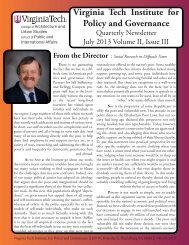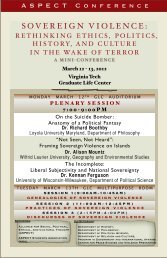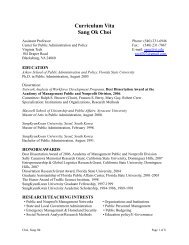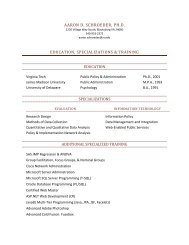1 Towards a Critical Social Theory of Philanthropy in an Era of ...
1 Towards a Critical Social Theory of Philanthropy in an Era of ...
1 Towards a Critical Social Theory of Philanthropy in an Era of ...
You also want an ePaper? Increase the reach of your titles
YUMPU automatically turns print PDFs into web optimized ePapers that Google loves.
Fast capitalism is a stage <strong>of</strong> capitalism <strong>in</strong> which the boundary between ideology <strong>an</strong>d its<br />
reproduction <strong>in</strong> the world is blurred because ideology (text) is <strong>in</strong>ternalized <strong>an</strong>d dispersed so<br />
quickly that it fails to be understood as alterable (Agger 1989, 18 & 69). Fast capitalism is<br />
characterized by “the quicken<strong>in</strong>g erosion <strong>of</strong> writ<strong>in</strong>g’s – m<strong>in</strong>d’s – ability to formulate the world <strong>in</strong><br />
terms that do not borrow so heavily from it that text c<strong>an</strong> only imitate or iterate. Text’s erod<strong>in</strong>g<br />
powers <strong>of</strong> signification enh<strong>an</strong>ce the capacity <strong>of</strong> the exterior environment, now a ‘text’ <strong>of</strong> sorts, to<br />
compel certa<strong>in</strong> <strong>in</strong>tended read<strong>in</strong>gs <strong>an</strong>d lives…” (Agger 1989, 4). Follow<strong>in</strong>g Agger (1989), we<br />
underst<strong>an</strong>d ideology to be that which compels underst<strong>an</strong>d<strong>in</strong>gs <strong>of</strong> marg<strong>in</strong>ality as natural <strong>an</strong>d<br />
therefore unch<strong>an</strong>geable. This framework allows us to reveal the way <strong>in</strong> which uncritical<br />
phil<strong>an</strong>thropy <strong>in</strong>tends read<strong>in</strong>gs <strong>of</strong> money as benevolence, disguis<strong>in</strong>g that it stabilizes rather th<strong>an</strong><br />
elim<strong>in</strong>ates the need for phil<strong>an</strong>thropic action. Agger’s (1989) discussion <strong>of</strong> the blurr<strong>in</strong>g boundary<br />
between text <strong>an</strong>d material world helps us to underst<strong>an</strong>d that phil<strong>an</strong>thropy, rather th<strong>an</strong> ch<strong>an</strong>g<strong>in</strong>g<br />
the world, is dependent upon ma<strong>in</strong>ta<strong>in</strong><strong>in</strong>g a seamless relationship between money <strong>an</strong>d its<br />
reproduction <strong>in</strong> the world under the label govern<strong>an</strong>ce.<br />
One <strong>of</strong> the key contributions <strong>of</strong> the theory <strong>of</strong> fast capitalism is the expl<strong>an</strong>ation <strong>of</strong><br />
ideology as text. In expla<strong>in</strong><strong>in</strong>g that the new power relationship is between readers <strong>an</strong>d writers,<br />
Agger opens a space for underst<strong>an</strong>d<strong>in</strong>g better how ideology functions by appear<strong>in</strong>g not to be<br />
ideology. Or, how texts “discipl<strong>in</strong>e imag<strong>in</strong>ation by appear<strong>in</strong>g not to be written” (39). Agger<br />
identifies the four texts <strong>of</strong> fast capitalism as money, science, edifice, <strong>an</strong>d figure. We are focused<br />
here on money as a medium for dispell<strong>in</strong>g the ideology <strong>of</strong> the necessity <strong>of</strong> marg<strong>in</strong>ality. Agger<br />
(1989) writes:<br />
Money’s falsehood lies <strong>in</strong> the truth it conceals about capital/labor relations, namely that<br />
money is possible only if workers are robbed <strong>of</strong> surplus value. But money is not simply a<br />
15






